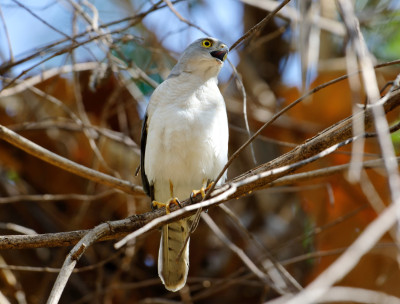BOISE, Idaho – A 7-week-old Ridgway’s Hawk fledged from its nest on Wednesday, July 10, marking another milestone in the effort to save the critically endangered species from extinction.
The chick was produced by adult Ridgway’s Hawks that were released by The Peregrine Fund with support from the Puntacana Ecological Foundation, into protected habitat inside Punta Cana’s resort property. The pair was the first to reproduce outside their previously small stronghold in a national park in Dominican Republic, the only place where the bird existed.
“The fledgling finally took the leap from the nest after one of the adults brought him lunch,” said project coordinator Thomas Hayes, who has been monitoring the adults since February. “He looked strong and flew like he knew what he was doing.”
The parents will continue to provide food while the fledgling hones his hunting and flying skills and is able to survive on his own. The Peregrine Fund field crew also will be keeping watch over the young bird, monitoring and recording its progress to independence.
In 2008, The Peregrine Fund began an innovative “assisted dispersal” project to re-introduce the species by determining whether a breeding population could be re-established in the bird’s former range. Biologists move young hawks from Los Haitises National Park and release them at suitable sites up to 100 miles away.
“This is a fantastic step forward and proof positive that assisted dispersal will work with this species,” said J. Peter Jenny, president of The Peregrine Fund, an Idaho-based conservation group focused on birds of prey.
Historically, the Ridgway’s Hawk was found throughout the Dominican Republic and Haiti. After researching and monitoring the species for a decade, The Peregrine Fund found that only about 300 individual birds remained, leaving them vulnerable to catastrophic events such as fire, hurricane, or disease. All the birds were confined within the poorly enforced borders of Los Haitises National Park in eastern Dominican Republic.
The parents of the young hawk are a male that The Peregrine Fund moved from the park and released in 2011 and a female released in 2012. Biologists climbed up to the nest on June 12 to check the health of the nestling. It was treated for bot flies, a parasitic insect that can be fatal to young in the nest, but was otherwise in good shape, Hayes said. On July 2, biologists fitted the chick with an identification band and radio transmitter to aid them in monitoring the young bird.
In addition to the assisted dispersal efforts, Peregrine Fund biologists are monitoring the remaining wild population of Ridgway’s Hawks in Los Haitises National Park. Conservation of the core population remains a top priority for preserving this critically endangered species, said Russell Thorstrom, director of the West Indies Project for The Peregrine Fund.
More information about The Peregrine Fund’s West Indies Project:
http://peregrinefund.org/projects/west-indies
http://peregrinefund.org/test-explore-raptors-species/Ridgway%27s_Hawk
Did you know?
- The Ridgway's Hawk is one of the most critically endangered raptors in the world, with only 250-300 individuals remaining.
- This hawk often builds its nest right on top of an active nest of the Palm Chat, the national bird of Dominican Republic. The hawks add larger twigs on top of the existing Palm Chat nest, without causing any harm to the smaller birds nesting below.
- The Ridgway's Hawk is the only diurnal raptor found exclusively in Dominican Republic.
For more information, contact:
Erin Katzner
Director of Global Engagement
Main Phone: 208-362-3716
Direct Phone: 208-362-8277






